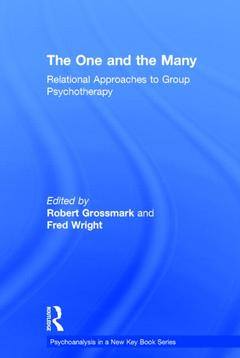The One and the Many Relational Approaches to Group Psychotherapy Psychoanalysis in a New Key Book Series
Coordonnateurs : Grossmark Robert, Wright Fred

The One and the Many: Relational Approaches to Group Psychotherapy applies advances in relational psychoanalysis to the theory and practice of group psychotherapy. In this volume Robert Grossmark and Fred Wright bring together leading writers in the group psychotherapy field, both psychoanalysts and group therapists, who have integrated ideas from contemporary relational psychoanalysis. Together, they constitute a vibrant and dynamic new wave in group psychotherapy and psychoanalysis that challenge much accepted wisdom and practice in the field, including classic group psychotherapy ideas regarding the therapist?s role, the group-as-a-whole and unconscious processes in group.
In this book, Grossmark and Wright show how the development of relational psychoanalysis has had a transformative impact on the field ofpsychoanalysis that has reverberated in the group psychotherapy world. The contributors illustrate how the broadening scope of the contemporary relational scene offers much that coheres with and amplifies the theory and practice of group treatment. The focus on dissociation, enactment, trauma, mutuality and intersubjectivity in the clinical setting, the foregrounding of sub-symbolic communication and implicit relational knowing, the registration of mutual containment and mutual regulation, all open new and exciting vistas for understanding the process and healing properties of group treatment.
The One and The Many expands the theory and practice of group psychotherapy offering innovative and refreshing ways to understand group interaction and to formulate interventions in both large and small groups. This book will be of interest and practical help to all who practice group psychotherapy, group process, psychoanalysis and psychotherapy in general, including all mental health practitioners, psychoanalysts, psychotherapists, psychiatrists, social workers, counsellors and pastoral counsellors.
Grossmark, Wright, Introduction. Wright, Personal Reflections on Hugh Mullan: Existential Group Therapist. Wright, Being Seen, Moved, Disrupted and Reconfigured: Group Leadership from a Relational Perspective. Weinberg, The Group as an Inevitable Relational Field Especially in Times of Conflict. Grossmark, The Edge of Chaos: Enactment, Disruption and Emergence in Group Psychotherapy. Grossmark, Repairing the Irreparable: The Flow of Enactive Engagement in Group Psychotherapy. Billow, Developing Nuclear Ideas. Levine, Progressing While Regressing in Relationships. Fosshage, Use and Impact of Empathic, Other-Centered and Self Listening/Experiencing Perspectives in Analytic Group Psychotherapy. Livingston, Interventions at an Impasse: Vulnerability, the Group Leader's Use of Self, and Sustained Empathic Focus as a Bridge Between Theory and Practice. Flores, Group Psychotherapy & Neuro-Plasticity: An Attachment Theory Perspective. Cohn, Using a Systems Lens to Illuminate the Intersubjective Field in Group. Rizzolo, Rethinking Tavistock: Enactment, the Analytic Third, and the Implications for Group Relations. Segalla, Relational Experiences in Large Group: A Therapeutic and Training Challenge.
Robert Grossmark is a psychoanalyst in private practice in New York City. He teaches at the National Institute for the Psychotherapies, the Eastern Group Psychotherapy Training Program, and the Doctoral Program in Clinical Psychology at the City University of New York (CUNY). He supervises in the New York University Postdoctoral Program in Psychoanalysis, the National Institute for the Psychotherapies, and the CUNY Clinical Psychology Doctoral Program. He is the co-editor of Heterosexual Masculinities: Contemporary Perspectives from Psychoanalytic Gender Theory (Routledge, 2009)and writes on psychoanalytic process.
Fred Wright is Emeritus Professor of Psychology at the John Jay College of Criminal Justice of the City University of New York. He has practiced psychotherapy in New York City for forty years, writing and publishing on the topics of shame and guilt in human experience as well as violence and antisocial behavior. He is also co-editor of the book Forensic Psychology and Psychiatry (New York Academy of Sciences, 1980).
Date de parution : 07-2014
15.6x23.4 cm
Disponible chez l'éditeur (délai d'approvisionnement : 14 jours).
Prix indicatif 304,89 €
Ajouter au panierDate de parution : 07-2014
15.6x23.4 cm
Disponible chez l'éditeur (délai d'approvisionnement : 14 jours).
Prix indicatif 88,32 €
Ajouter au panierThème de The One and the Many :
Mots-clés :
psychotherapy; Fred Wright; Haim Weinberg; Richard M; Billow; Ronnie Levine; James L; Fosshage; Marty Livingston; Philip J; Flores; Barbara R; Cohn; Young Man; Gregory S; Rizzolo; Vulnerable Involvement; Rosemary Segalla; National Group Psychotherapy Institute; Conference Consultants; Nuclear Idea; Group Free Association; Group Relations Conferences; Therapist’s Subjectivity; Donnel Stern; Listening Perspectives; Enactive Engagement; Familiar Chaos; Group Therapy Field; Analytic Group Therapy; Related Self-states; Louis Ormont; American Group Psychotherapy Association; Empathic Listening Stance; Analyst’s Subjectivity; Limbic Resonance; Empathic Perspective; Large Group Members; Tavistock Model; Analysand’s Experience; Empathic Listening



